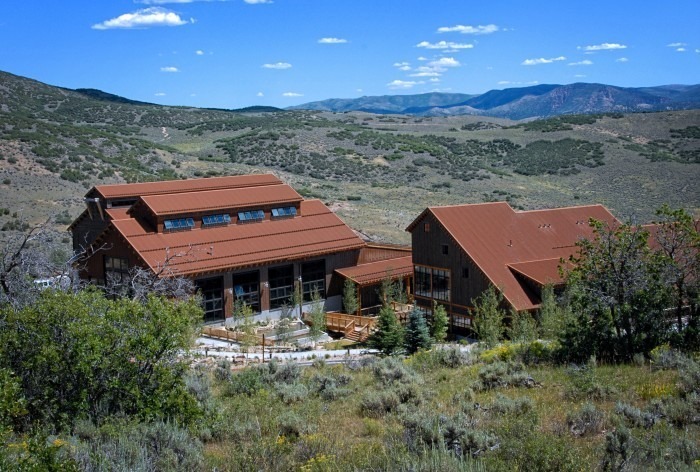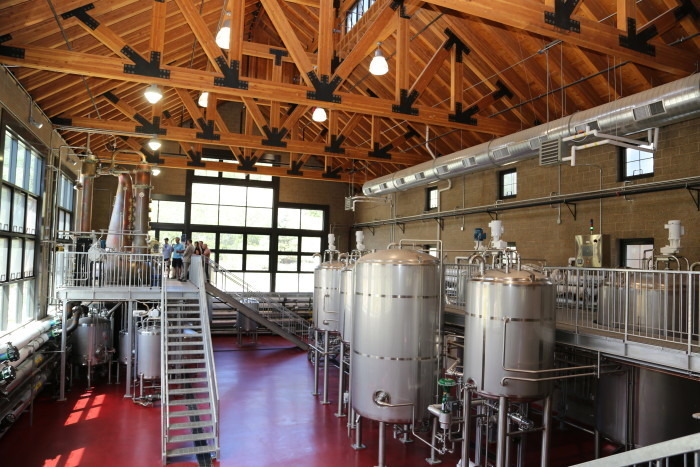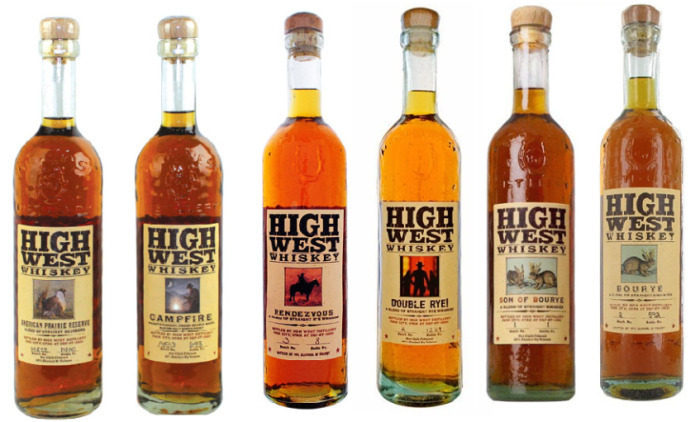High West's David Perkins Has Something To Say To Those Who Think There's No Booze In Utah
High West Distillery proprietor David Perkins chuckles when asked about Utah's prohibitive liquor laws. "You realize that the liquor laws everywhere are pretty screwy, right? We don't have the monopoly on crazy liquor laws." He also doesn't hesitate when asked to name the biggest misconception about his hometown state: "That there's no alcohol here," he laughs.
But alcohol there is. And there's some mighty fine stuff being produced in-state. In fact, Perkins is giving me a tour of his brand-new distillery — High West's second in the Park City area — located on a historic 3,500-acre cattle ranch called Blue Sky. That's a whole lot of room for Perkins to experiment making some of the country's most interesting whiskies. High West has gained national acclaim for its mixing of both different ages and types of whiskey together to create unique blends. After all, experimentation has been in Perkins's DNA for years. Upon graduating college in 1990 with a degree in biochemistry, he worked for biopharmaceutical companies Amgen and Pfizer, experiences he claims parallel his current profession. "This is biotechnology. It's the same exact thing I did at Amgen: They make a drug; this makes a drug called ethanol." As long as his products continue to taste the way they do, we're inclined to agree with just about whatever he says. He sat down with us at the Blue Sky facility to talk all things High West whiskey.

So what are some of Utah's unique liquor laws?
We've had a couple. There was a wonderful guy who was running for president named Jon Huntsman, and when he was our governor, he got rid of one law that said you had to be a member of a club to go to a bar. The bars required memberships, so you'd go to the door and they'd say, "Are you a member?" You'd say, "What?"
When was that rule overturned?
I think that went away in 2009, when Huntsman was governor. Then Obama invited him to be the ambassador to China, and unfortunately our great governor went away from us.
We have a law that is normally called the Zion curtain law. The locals don't like that very much, of course. It's a requirement — the church, they don't drink, so certain licenses in restaurants, they don't want anybody seeing someone mixing a drink, and you have to mix drinks behind a wall. The wall is not officially called a Zion curtain, but that's what everybody calls it. We don't have that license, and in fact there's a license where you don't have to do that. They limit it by population, though, so they're out of them, and it's the most popular license. We're trying to convince the state to free those licenses up.
High West is the first legal distillery in Utah since 1870, is that right?
That's right. According to data we found, the last stills were run by the Mormons. When the Gentiles started coming, they sort of cut the stills off. We don't really know much about it, but we haven't found any legal distilleries since 1870.
Do you know why the stills shut down in 1870?
No, we tried to research it. But we think it was when the Gentiles came, which are the non-Mormons — I'm Gentile, by the way.
As am I.
When the Gentiles came, [the Mormons] just wanted to segregate their lives from the Gentiles. The Mormons also used to grow tobacco — tobacco is very water-intensive, and we're in a desert. We did find a reference to — the Mormons often popped around and they put those discussions up with the Word of Wisdom. There was one time where God said it's not a good idea to grow tobacco anymore, and you know God is very practical. He probably just figured it's a desert and it's not a good idea.
Do you know why no one else did it legally in-state until High West came to Park City in 2009?
Well, no one really did it legally around the United States. There were 2,500 to 3,000 distilleries before Prohibition, and then Prohibition put them all out of business and they consolidated. In 2000, there were probably 40 distilleries. So there weren't really any legal ones anywhere. Then the world changed for everybody, not just Utah. I think there are five distilleries in Utah now.

Can you talk a little about your unique aging processes?
At the end of the day, I was just trying to make payroll. The marketer's mantra was "differentiate" — as a consumer, give me a reason to buy. Rendezvous Rye was our first product. We blended a 6- and a 16-year-old. People in cognac do this all the time, but it was innovative for American whiskey. I got turned on to cognac, and I wondered why nobody does that with whiskey, because we have to put these age statements on them. We tried it, and it's delicious. I would put it up against any rye whiskey anywhere; I dare you to find a better rye whiskey. It's just delicious.
Double rye is the same thing: We spread that out even further to get more spice. For the Bourye, we just blend bourbon and rye. Nobody that we knew of did bourbon and rye at the time, though I read some old advertisements from the '40s where I did see some bourbon-rye blends.
What about your barreling?
As you've probably figured by now, I like running experiments and figuring out what makes things taste good. Our head sales guy, Mat [Garetson], used to make wine. One day I said to him, "Call all the guys in California and get us some barrels here." So we had Cabernet barrels, Pinot barrels, vermouth barrels, port barrels. One day we were tasting them all, and a couple combinations really jumped out at us: One was rye aged in port, one was rye aged in French oak and one was rye aged in Hungarian oak. We mixed it together after the tasting and that became A Midwinter Night's Dram. You pick up cherries from the port, spice from the French oak and big mouths from the Hungarian oak. It's all these different things. We're learning. Of course, we had a bunch of barrels that were nasty.
Vodka is called the tasteless spirit, but you distill yours from oats. Do you feel like you taste something different?
Oh, God, yeah. It's still clean, but it's heavier, so you have a much longer finish. A typical vodka drinker will drink it and say, "This tastes like vodka, but there's more here."
High West proprietor David Perkins describes some of his products:

Campfire
"The world's only blend of bourbon, rye and scotch. It's sweet from the bourbon, spicy from the rye and smoky from the scotch. People say you can't mix sweet and smoke, but we do it all the time with barbecue!"
Double Rye
"Our number-one seller. It's a blend of 2-year-old rye and a 16-year-old rye. It's cinnamon-y."
Rendezvous
"For me, it tastes like Christmas."
Valley Tan
"Feminine, pretty, floral, soft. It's a beautiful whiskey."
Midwinter Night's Dram
"Christmas pudding."

